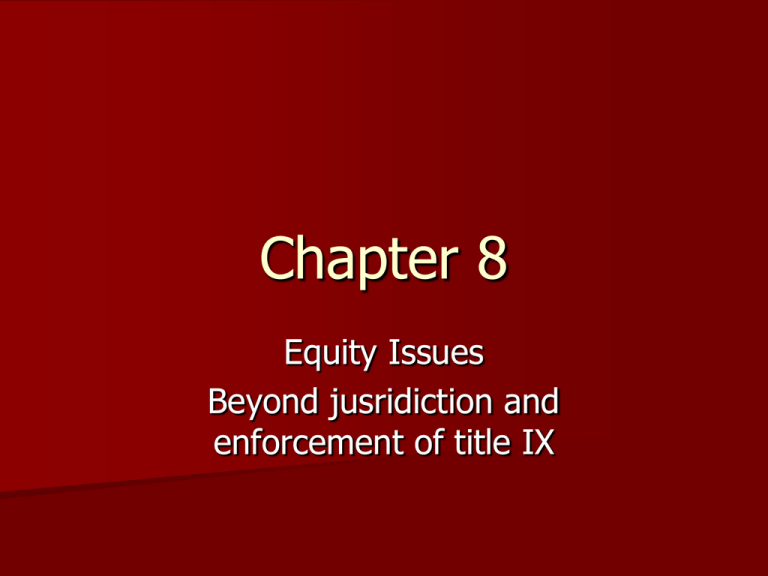
Chapter 8
Equity Issues
Beyond jusridiction and
enforcement of title IX
Title IX
Title IX requires that when programs as a
whole are reviewed (not on a sport versus
sport basis), equity exists. To aid in the
review 13 program areas are used
Title IX
1.
2.
3.
4.
5.
6.
7.
8.
9.
10.
11.
12.
13.
Athletic financial assistance
Accomodation of interests and abilities
Equipment and supplies
Scheduling games and practices
Travel and per diem allowences
Tutors
Coaching quality and availability
Locker rooms, gyms, fields
Medical and training services
Housing and dining
Publicity
Support services
Recruitment
Title IX
Disparities between the sexes in any of
the 13 program areas may be evidence of
title IX complience issues
– This does not mean disparity between men’s
and women’s teams of the same sport
– The correct way to look at it is a program
wide anaylsis
This means the same percentage (based on the
ratio of participants of each sex in the athletic
program) of males and females need to be
receiving similar benefits
Title IX
1.
2.
3.
4.
5.
6.
7.
8.
9.
10.
11.
12.
13.
14.
15.
Does a higher percentage of one genders athletes enjoy
Exclusive locker room space
Full time coaches
Experienced coaches
Multiple assistant coaches
Higher per diem allowances
Trophy cases in high traffic, prestigious loactions
Certified athletic trainers rather than student athletic trainers at
games
Media guides of greater length and/or quality
Air transportation or cheuffered coach transportation
New high tech facilities
Acess to secretarial help
Recruiting expenses paid in advance
Exclusive weight room acess
Prime competitive or practice times
Lighted fields
Benefit Versus Dollars
Equitable treatment is judged on the basis
of benefit received rather than the dollars
that are spent
– Equity and title IX require that the male
football player and the female track athlete
receive equal benefits regarding uniforms and
equipment, but not equal dollars spent
– Only financial aid involves equity of dollars
Participation Opportunities
A large area of title issues comes from the
requirement to provide equal access to
opportunity through “accomodating the
intrests and abilities” of the historically
underepresented sex
The interpretations provide a threepronged test to determine complience
– A institution only needs to meet one of the
three prongs in order to comply with the
interest and abilities requirement
1.
2.
3.
The intercollegiate or interscholactic level of
participation opportunities for male and female
students is provided in numbers substantially
proportionate to their respective enrollments
The institution can show a history and
continuing practice of program expansion that
is demonstably responsive to the developing
interests and abilities of the underepresented
sex
The institution can show that the intrests and
abilities of the members of the historically
underrepresented sex have been fully and
effectivly accomodated by the present program
Participation opportunities
Cohen v. Brown University 1997 was a hard fought case
involving the first prong
https://www.msu.edu/~thomp725/TitleIX/run3.htm
Most people who have moved toward title IX complience
have met prong 2 or 3
– The office of civil rights (OCR) has made it clear that
schools can choose which prong they wish to meet.
– If the school chooses to meet the first prong they are
given the bonus of safe harbor meaning that if they
meet this the OCR will not look any farther to see if
the institution is actually providing equal access
The supreme court has decided not look at the cases
that deal with the propotionality prong and let the
rulings of the lower courts stand
Participation opportunities
One of the other prongs to measure compliance is to meet the
interests and abilities of the underrepresented sex
– This can be done through surveys or asking the student
population
– Lets say we have a club level women's lacrosse program that
has asked to be made varsity does this meet title IX to just have
a women's club team
The answer is no the school has to meet the interests and
abilities so because they are good enough to bee varsity they
have to be varsity
This also does not mean the school will be compliant if they
add another women’s sport instead. They are still not meet
the interests of the female athletes
This also doesn’t mean that a men’s sport has to be added to
keep the numbers even because males are not the under
represented sex
Participation opportunities
Title IX protects employees as well as
students
– In the court case Jackson v Birmingham
jackson complained to the school board about
the inequitable treatment of female student
athletes
– The school board fired him as a result and the
board argued that employees have no private
right of action under title IX limiting jackson
to the valueless OCR complaint alternative
– The supreme court disagreed and made it so
that people who spoke up against title IX
issues had private protection
Historically under represented sex
Title IX was designed to protect the
historically under represented sex
Even after some men’s teams are cut
there are still not enough women’s teams
to meet the proportionality prong
Smaller rosters sizes have been a way to
meet title IX and can be frustrating for the
team
– Even though not recommended this a legal
way to meet title IX compliance
Revenue and non revenue sports
Title IX does not rank the importance of
sports
– A school cannot explain gender based
imbalance in any of the 13 areas by saying
the sport has those benefits due to revenue
– The designation of revenue sport is irrelevant
in relation to titleIX
Boosters and Title IX
When there are gifts from boosters the
institution cannot evade its legal obligation
to provide equal benefits to male and
female athletes
If a men’s team receives a gift the athletic
department must find a way to provide an
equal benefit to the women’s program
– If there is no way to provide that equity the
school must either teach the donor about
giving to the whole athletics department or
refuse the gift
Co-Ed participation, the right to try out, and
contact sports
Participation on teams is most often determined by a competitive format
– Where selection for a team is based upon competitive skill or the
activity involved is a contact sport single sex teams may be formed
The issues of boys playing on a field hockey team has come up, but title IX
does not protect men so this is a non issue
Physical education classes are also required for equality under title IX
– All physical education classes must be coeducational except those that
are defined as contact sports (wrestling, boxing, rugby, ice hockey,
football, and basketball)
– They may be conducted as single sex but do not have to be
Scheduling class conflicts is also against ht elaw
– For example if the school offers dance class and football class at the
same time the idea is to try and get the females to be in dance and
form a de facto segregation
Sexual Harassment
Title Ix is not the only law to protect against sexual harassment
– Title VII is the most prominent and the 14th amendment
– Title VII only covers the workplace, and the 14th by a state actor and
title IX is education
Title VII is the only one with a definition of sexual harassment
– Quid pro quo is the more overt and recognizable harassment and least
subjective of the two
When someone offers a promotion for sexual favors, or an athlete is
offered a plaxe on the team both the worker and the athlete could
use title IX to combat the sexual harassment
– Hostile environment
This is when a supervisor fondles a co worker or the coworkers
behavior in the workplace includes a daily occurrence of crude sex
based jokes
This is when sexual harassment makes the environment hostile




